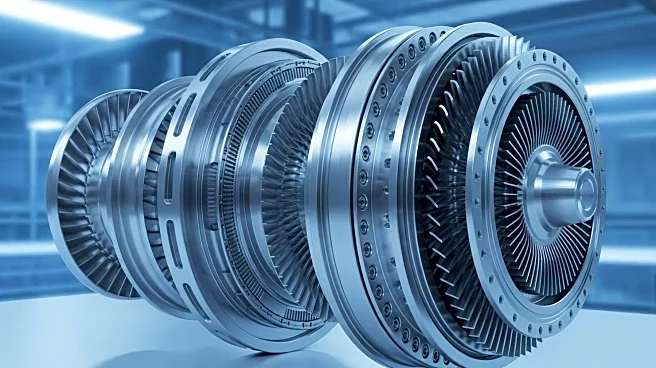What's Happening?
The energy sector is experiencing a significant transformation driven by the urgent need for sustainable solutions to meet increasing global energy demands while addressing the climate crisis. Advanced manufacturing technologies are playing a crucial role in this transition by enabling the development of innovative materials and processes that enhance the efficiency and effectiveness of energy technologies. These advancements include additive manufacturing, nanotechnology, automation, and digital twins, which are revolutionizing production processes and fostering the creation of cleaner, more efficient energy systems. The focus is on harnessing the collective expertise of researchers and practitioners to explore cutting-edge manufacturing techniques that can support the development and deployment of next-generation energy solutions.
Why It's Important?
The integration of advanced manufacturing technologies in the energy sector is pivotal for achieving sustainability goals and reducing carbon footprints. By developing energy-efficient materials and innovative manufacturing processes, the sector can significantly lower its environmental impact. This transformation is essential for meeting global energy demands sustainably and responsibly. The collaboration across disciplines and the sharing of insights and breakthroughs are crucial for addressing the complex challenges posed by energy sustainability. The advancements in manufacturing not only enhance the academic landscape but also provide actionable frameworks for industry practitioners seeking to innovate within this critical sector.
What's Next?
The ongoing exploration and implementation of advanced manufacturing technologies in the energy sector are expected to continue, with a focus on integrating smart manufacturing systems in energy production and applying circular economy principles in energy technology manufacturing. This will likely involve increased collaboration among researchers, industry practitioners, and policymakers to develop and deploy sustainable energy solutions. The sector will need to address challenges related to energy efficiency, carbon reduction, and the integration of new technologies into existing systems. As these efforts progress, they will contribute to the broader goal of achieving a sustainable and resilient energy future.
Beyond the Headlines
The shift towards advanced manufacturing in the energy sector also raises ethical and cultural considerations, such as the equitable distribution of energy resources and the potential impact on employment in traditional manufacturing roles. The transition to more automated and technologically advanced processes may require workforce retraining and adaptation to new roles. Additionally, the emphasis on sustainability and environmental responsibility reflects a broader cultural shift towards valuing long-term ecological health over short-term economic gains.








